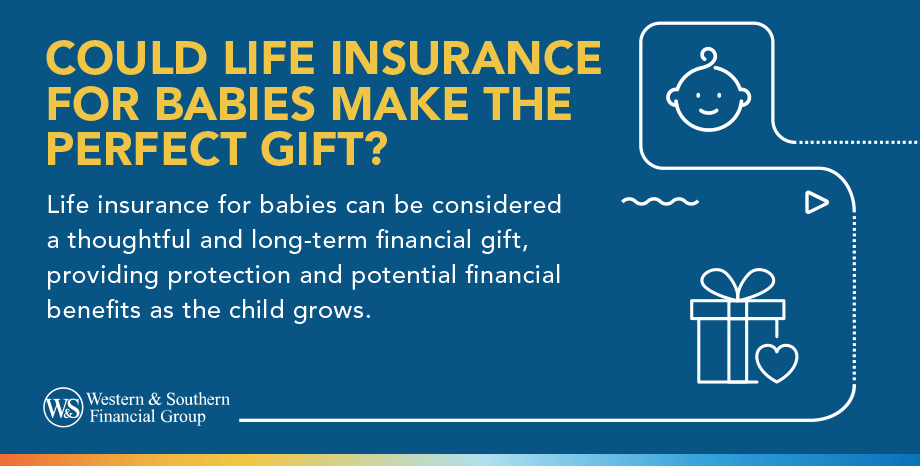

Table of Contents
Key Takeaways
- Term life insurance is a cost-effective option for providing financial protection to a baby and their family in case of a tragedy.
- Permanent life insurance, such as whole life, offers coverage for the baby throughout their life, ensuring they have insurance even if they develop health issues.
- Buying life insurance for a baby is a gift that becomes more valuable over time and may offer tax benefits.
- The cost of life insurance is typically lower when purchased at a younger age, making it an opportune time to consider coverage for a baby.
- Life insurance policies for babies can provide opportunities for additional coverage in the future and can be passed down as a gift to their own children.
Consider past baby gifts: Outfits too small, wrong-colored blankets, duplicate toys. Parents may not appreciate a life insurance gift at first. Yet, beyond cute teddy bears, the policy you give will be treasured long after.
Of course, life insurance could be a saving grace if the unthinkable happens and the death benefit should always be represented as the most important benefit. There are many other benefits that could become more valuable as the baby grows.
Tailoring the Gift
First, it's important to consider the choice between term life and permanent life insurance policies.
Term Life Insurance
Term life insurance lasts for a set amount of time — usually 10, 15, 20 or 30 years. It's attractive to many people because it's generally less expensive than permanent policies and the rate remains constant. Some companies have strict requirements for term life insurance for babies, such as adding a rider onto the term life policy of the parents or guardians. Other companies offer stand-alone policies down to age zero.
You might consider a term life for a baby. There are multiple options available, but some run from ages zero to 17 and are generally available in amounts of $10,000, $20,000 and $30,000. There are also some riders, generally available at no extra cost, that provide various coverage or premium waivers in case of terminal diseases, permanent disability or the death of the policy owner.
A term life policy could help a family financially if a tragedy occurs. The death benefit could be used by the baby's parents or guardians to pay for arrangements, lost wages, child care and other expenses that often accompany such tragedies. Term life insurance could also be converted to whole life insurance when the child reaches a certain age — regardless of his or her health situation at that time.
Permanent Life Insurance
When it comes to permanent life insurance, many people think of whole life, but that's only one type of insurance that falls under that category. Other options include interest-sensitive whole life and universal life. That said, whole life is a popular type of life insurance bought for babies.
Whole life plans vary greatly when adults purchase them to cover their own lives. Subjective criteria — including age, health, place of residence and occupation — are considered when premiums and benefits are set for adults. Many adults who choose whole life generally do so because it offers cash value. Some policies also pay dividends, but those aren't guaranteed.
It helps ensure the baby will have insurance coverage as an adult, which could be important in case the baby later develops health issues that may disqualify them for insurance. The same is generally true for purchasing whole life insurance for children and healthy young adults.
The Gift That Keeps on Giving
Whichever type of insurance you think is right for the baby in your life, consider these additional benefits:
- The cost will likely never be lower. Generally, the younger the person is when they are insured, the less the policy costs. And it may also be possible to lock in the premium at the current age of the baby receiving the gift.
- You give more than your money's worth. It may not be long before the life insurance policy is worth more than its face value. Of course, that isn't your primary consideration, but it's a nice bonus for you and the recipient (and their parents!). There aren't many other gifts that become more valuable with time. Life insurance could grow in value — and its value could be tapped later in the recipient's life. However, it's important to note that taking withdrawals or loans from the value could have adverse effects on the policy, with the possibility of tax implications.
- There may be tax benefits. Policies vary, of course, but taxes could be deferred on the money that accumulates.
- Life insurance policies for babies could provide the recipient opportunities for additional future coverage. There are various options, but the policy will remain intact as long as payments are made in full. And there are optional riders on some insurance plans that allow the recipient to increase coverage later.
- The gift continues to give. When the baby is an adult and assumes the policy, they could change the beneficiary. That could provide them a ready-made gift for their child.
The Bottom Line
Now could be the best time to explore the various possibilities of life insurance for babies — so you're ready with the gift when it's needed. Chances are your thoughtfulness will be remembered long after they outgrow their onesies.






























